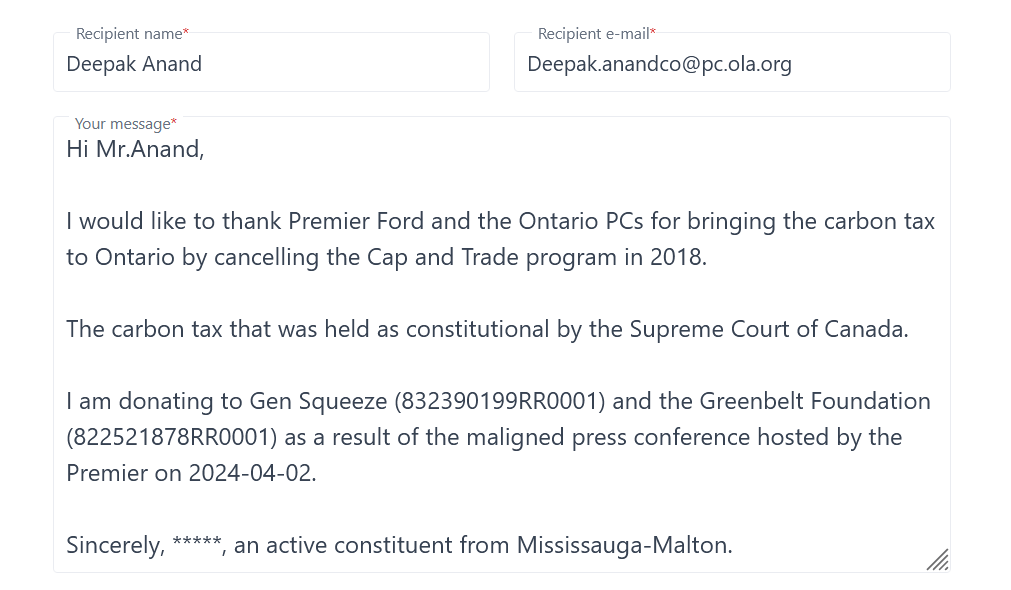So what's your point? That apathy means that we should not improve our democracy?
This wouldn't be a concern under proportional representation (PR). And let's get PR without this nonsense of a referendum.
Join the discussion over at !fairvote@lemmy.ca.
- In 2024, Fair Vote Canada sent out "almost 60,000 emails to members and supporters" [Steve Hindle, FVC co-chair].
- This isn't to say a data breach is acceptable, but Fair Vote Canada is mostly volunteer run.
This wouldn't be a concern under proportional representation (PR). Join us over at !fairvote@lemmy.ca.
I think I should be included as well for similar reasons. It's also good redundancy to have multiple moderators!
Edit: I also actually volunteer with the Fair Vote Canada regularly.
Somebody needs to just enact PR. I think with the most recent BC election, there's no reason Greens shouldn't attempt to force PR. The Greens should be aggressive and use their balance of power, otherwise they might face extinction under Duverger's law.
I've also thought it might be a good idea if parties work together, not to split the vote. So for BC, Greens could get the island (and not run candidates in the mainland), while NDP for mainland (and not run candidates on the Island). They are more alike than they are different.
I like the general strike idea, but it needs to be coordinated. We've been too conditioned to accept our broken FPP system.
I've also been thinking about PR for civil society for example with the Council of Canadians.
- IRV and STV both use "ranked ballots".
- IRV is not PR, STV is PR.
- Trudeau only wanted IRV, so he kept saying "ranked ballot". However, electoral reform proponents want "every vote to count" just like the LPC campaigned on.
- The House of Commons Special Committee on Electoral Reform (ERRE) recommends PR and does not recommend IRV. Therefore, Trudeau kills electoral reform, claiming a "lack of consensus".
- End of this story, but not the end of PR.
I'd agree with referendums, if they were widely used in other issues. Like, what would the referendum on the Greenbelt look like? What about Ontario Place? What about the sneaking privatization of our public healthcare systems? What about Doug Ford himself?
Referendums for electoral reform are really just a way for the government/establishment to look like they are fulfilling a campaign promise, without actually improving the system. It's worse than virtue signalling, cause after a (failed) referendum, it harms the PR movement. Even though it can be demonstrated that PR is mathematically superior to FPP...
And also, why do we pay our representatives in the first place? It's their job to understand the policies and issues such as proportional representation, then act in the best interests of their constituents. Obviously, ensuring every vote counts, and no group holds disproportionate power is something that improves our democratic institutions, and improving democratic institutions benefits constituents.
Anyway, that's why I keep pushing. PR proponents are holding the torch until that fateful day comes where PR is enacted.
The LPC campaigned on 2015 being the last election under FPP, along with ensuring "every vote counts".
When you say "make every vote count" this necessarily means proportional representation (PR). PR is the only viable long term solution being pushed by electoral reform advocates. Some examples of PR electoral systems:
Trudeau has only ever (secretly) wanted instant runoff voting (IRV) to replace the current first past the post (FPP). So when the tide shifted against him, he broke his election promise and bailed on electoral reform.
In either IRV or FPP, many votes will not count at all (>=50%). So neither IRV nor FPP satisfy the criteria for proportional representation (PR).
Note: lots of people use the term "ranked ballot", but this is inaccurate. Ranked ballot is simply a mechanism, and not an electoral system. For example, both IRV and STV use the ranking mechanism, but only STV is considered PR.
So while Trudeau was pushing for "ranked ballot", along with the "make every vote count" messaging, people are right to infer that STV would be implemented. STV uses ranked ballot but is still considered PR.
So that's 4 electoral systems:
- First-past-the-post (FPP)
- Instant-runoff voting (IRV)
- Mixed member proportional (MMP)
- Single transferable vote (STV)
Only MMP and STV are considered PR!
Join the conversation at !fairvote@lemmy.ca.
The only viable long term solution is proportional representation (PR). Some electoral systems meeting this criteria:
Canada needs to stop believing that PR requires a referendum. The only people pushing a referendum are those with ulterior motives or are misinformed.
- There is no constitutional requirement. For example, in 1924 Alberta substantially changed their electoral system, adopting some PR elements.
- In 2005, BC held a referendum with 57.69% in favour of a PR electoral system known as Single Transferable Vote (STV). No change whatsoever occurred.
- The electoral system has been modified many times without a referendum. For example, per-vote subsidies were removed by Conservatives in 2011 no less, which sparked the famous prorogation of parliament.
- Referendums, no matter how clear the question is, aren't an appropriate tool. Ordinary people just don't have the time to weigh the pros and cons of various electoral systems. Citizen's assemblies would be more appropriate, as this would require comprehensive analysis by ordinary citizens.
- Why would we need a referendum to restore the fundamental rights of voters? The right to vote must necessarily include the right for the vote to have an effect. Literally millions of perfectly valid ballots are simply tossed out every single election. This would be an outrage had we not been conditioned to accept it.

And Pharmacare, and dental care. These are just some examples of what government can deliver when we have a representative democracy, as guaranteed under PR.